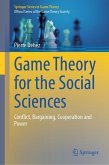Intended for undergraduate students, the book presents brief examples and comprehensive case studies to help them grasp the real-world implications of the theories. As such, it is suitable for an applied, yet technically precise approach to teaching microeconomics, as well as for a critical review of the economic mainstream. Starting from the question as to why and how societies organize economic activity, it analyzes the potential and limitations of various types of market with regard to alleviating scarcity and achieving distributive objectives, from an institutional perspective.
This second edition systematically expands on decision theory by including chapters on traditional decision theory under risk and uncertainty, and on behavioral economics, as well as a chapter presenting findings from the neurosciences, evolutionary psychology, and narrative psychology. Furthermore, there are theoretical additions, along with updated case studies and examples - from trade wars to pandemics and the climate crisis.
A new edition of the companion workbook features a wealth of exercises, ranging from basic multiple-choice questions to challenging mathematical problems and case studies, is also available.
Dieser Download kann aus rechtlichen Gründen nur mit Rechnungsadresse in A, B, BG, CY, CZ, D, DK, EW, E, FIN, F, GR, HR, H, IRL, I, LT, L, LR, M, NL, PL, P, R, S, SLO, SK ausgeliefert werden.









